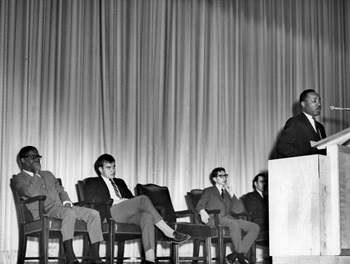In 1966, Dr. Martin Luther King spoke at Southern Methodist University regarding segregation, racial injustice, and moving the nation forward. This past year has been a difficult one with racial tensions within and outside of higher education. With affirmative action again before the Supreme Court, the coming year will continue to challenge us to implement King’s vision. I want to share a brief excerpt from his speech at SMU that should particularly convict our country as we select our next president.

I need not remind you of the dangers here. There is nothing more dangerous than to build a society with a large segment of people in that society who feel they have no stake in it, who feel they have nothing to do. These are the people who will riot. And in spite of the pleas for nonviolence, they often fall on deaf ears out of the frustrations of poverty, out of the frustrations of being left on the periphery of life, pushed out of the main stream of life. Out of the heaving desperation surrounding their days, they often end up seeing life as a long and desperate corridor with no exit sign. And so it is necessary to develop massive public works programs. It is necessary to develop massive training programs. It is necessary to lift the minimum wage and extend the coverage so that all of God’s children will have the basic necessities of life.
We live in a great nation, the greatest nation, the richest nation on the face of the earth, and I submit this afternoon that any nation that can spend billions of dollars to put a man on the moon can spend billions of dollars to put a man on his own two feet here on earth.
I was in Sweden and Norway some months ago. As we journeyed around Scandinavia, we saw no poverty. We saw no one in need of health care who couldn’t get it, medical care who couldn’t get it. We saw no slums. We saw no lack of quality education. And I said to myself, if these small countries in our world can solve these problems, certainly the United States with a national gross product this year of more than $700 billion can solve the problems so that nobody will have to live with poverty. We must see that still by the millions, we have many, many people perishing on the lonely island of poverty in the midst of a vast ocean of prosperity. And so this reveals that we have a long, long way to go in the economic area.
Now I mentioned that we have made numerous strides in breaking down the barriers of legal segregation. And I would like to say that something else is happening that all people of goodwill must be concerned about. Massive resistance has given way in the South to a sophisticated kind of resistance embodied in tokenism. If we are to have a truly integrated society, it will never develop through tokenism. We get a few Negroes in formerly all-white schools and say we have integrated schools. We get a few Negroes in fairly good jobs in plants, and we begin to say we have equal job opportunities in plants. And then it goes right on down the line in other areas.
The fact is that this kind of tokenism is much more subtle and can be much more depressing to the victims of the tokenism than all-out resistance. And so we have a long, long way to go in dealing with this problem, but it is not only a Southern problem that we face, it is a national problem.
The ghetto in the North is not being dispersed; if anything, it is being intensified. Segregation in schools in the North is not decreasing; it is increasing. And so it means that there must be a national movement, a national coalition of conscience to solve a problem that pervades our nation. So it may be true that, figuratively speaking, Old Man Segregation is on his deathbed, but we must always realize that social systems have a great last-minute breathing power, and the guardians of the status quo are always on hand with their oxygen tents to keep the old order alive. And so segregation is still with us. We still have a long, long way to go before the problem is solved. May I say to you this afternoon that I am convinced that if democracy is to live, segregation must die.
Segregation is a cancer in the body politic which must be removed before our moral and democratic health can be realized. We don’t have long to solve this problem. There is a bit of urgency about it. The shape of the world today no longer affords us the luxury of an anemic democracy. There is a revolt all over the world against colonialism, imperialism and racism. And all over the world people are saying racism and colonialism must go.
The full transcript and audio of the speech are available from SMU here.

